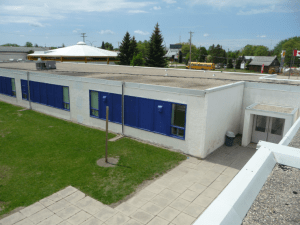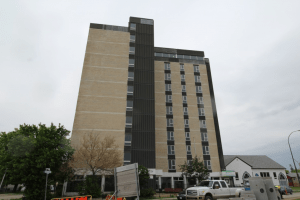RRC ranked top Prairie research college

Top row: Rob Spewak, RRC BETAC Manager; Lloyd Kuczek, VP with Manitoba Hydro; Jose Delos Reyes, RRC Research Manager. Bottom row: Kirsty Duncan, Minister of Science; Ray Hoemsen, RRC Research Director; David Johnston, Governor General of Canada; Neil Cooke, Dean, Teaching Excellence, Innovation and Research, RRC; Mario Pinto, President of NSERC. Credit: MCpl Vincent Carbonneau, Rideau Hall, OSGG
Red River College is #1 on the Prairies in research, according to the latest Top 50 ranking of Canadian research colleges.
It’s not the first time RRC has been recognized as a leading college research institution, having ranked previously in Research Infosources’s top ten for three years running, and having earlier this year received the prestigious Synergy Award for Innovation from the Natural Sciences and Engineering Research Council of Canada (NSERC) and the Governor General of Canada.
“We definitely appreciate the acknowledgement of our efforts, but the true value of this recognition is realized when we further spread the word that Red River College serves as a critical partner in innovation for so many organizations,” says Paul Vogt, RRC’s president and CEO.
“As we continue to make substantial investments in applied research and learning resources, we see increasing interest from industry partners for us to help them solve problems, innovate, and produce graduates with the advanced technology training needed for today’s globally-competitive environment.”
The College’s swath of research resources continued to expand this year when RRC received $5.9-million in federal funding – the largest influx of research dollars in the College’s history – from NSERC and the Canada Foundation for Innovation (CFI). This new investment allowed the College to boost innovation capacity in Manitoba’s vehicle technology and food development sectors.
“It’s exciting to see how far we’ve come in such a short period of time, and to witness the positive impact our work has had on so many projects throughout our province,” says Ray Hoemsen, executive director of Research Partnerships & Innovation at RRC.
The College has been involved in a number of notable projects, such as the all-electric transit bus (developed in conjunction with New Flyer, Manitoba Hydro, Mitsubishi Heavy Industries, the province, and others), and Manitoba Hydro’s downtown office building, where RRC tested and evaluated advanced designs and building products that helped make the structure one of the most energy efficient in North America.
“We’ve had a number of high-profile projects which really help raise awareness of our capabilities,” says Hoemsen. “But there is so much more going on beneath the surface, especially in areas like early child development, international business intelligence, clean water technology, and in the area of startup/entrepreneur support.”
Some of the latest research being pioneered at the College relates to the development of MotiveLab, which will feature a 3,000-square foot environmental chamber (large enough to fit a bus) that allows local industry to test products in all manner of environmental conditions.
The College has also recently emerged as a key player in culinary research, having helped Manitoba food producers and distributors create new products and develop innovative uses for locally grown food in healthy menu items.
“From the food we eat, to the transit buses on our road, to the office buildings that we work in, our research has expanded to a point where we are seeing more and more tangible results that will give Manitoba industry a competitive advantage on a global scale,” says Vogt.“It’s something all of us can be proud of.”

 In 2014/15 the École Heritage Immersion School in St Pierre-Jolys, Manitoba, underwent a major building envelope upgrade including complete removal and replacement of the west and north exterior walls plus the courtyard area.
In 2014/15 the École Heritage Immersion School in St Pierre-Jolys, Manitoba, underwent a major building envelope upgrade including complete removal and replacement of the west and north exterior walls plus the courtyard area. The Bluebird Lodge is currently undergoing a major building envelope upgrade, which got underway in late 2016. The upgrade is focused primarily on the exterior wall system.
The Bluebird Lodge is currently undergoing a major building envelope upgrade, which got underway in late 2016. The upgrade is focused primarily on the exterior wall system. Test results will be used to further expand BETAC’s growing database on airtightness characteristics of large commercial-style buildings which began in 2013 with the testing of 26 buildings in Manitoba.
Test results will be used to further expand BETAC’s growing database on airtightness characteristics of large commercial-style buildings which began in 2013 with the testing of 26 buildings in Manitoba.







